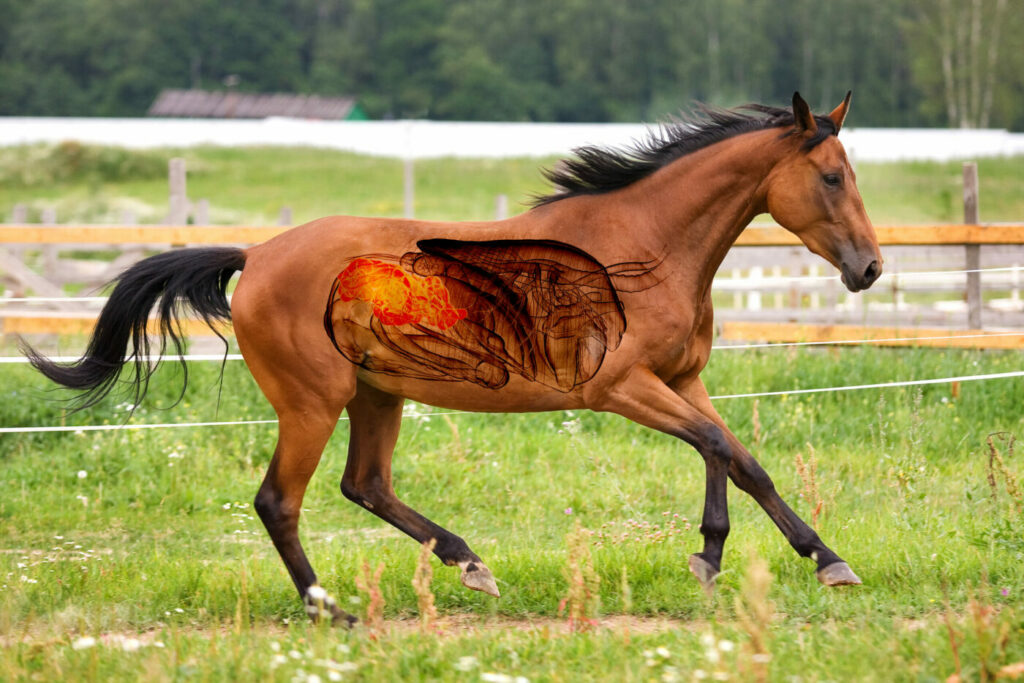
While gastric ulcers are a common focus in equine practice, intestinal pathologies found beyond the stomach may present a greater challenge for veterinarians. Enteritis and other intestinal disorders can be difficult to diagnose. But these digestive issues have a significant impact on equine welfare and performance.
Proactively identifying and minimizing the risks of enteritis is essential for managing digestive health in equine patients. Although some diseases associated with enteritis in horses aren’t preventable, certain horses have a higher risk than others.
Stall confinement, limited access to free-choice forage, infrequent meals, and the stress of training and competition can increase the risk of digestive tract pathology in performance horses. (Feary et al., 2006). While this is not directly related to causing enteritis, a horse in poor GI health may be more susceptible to small intestine pathologies. Owners and veterinarians should work together to develop management strategies for maintaining GI health for these horses. A healthy digestive tract is better physiologically prepared to resist and combat intestinal disease.
Daily supplementation with targeted nutrients may provide needed digestive support when lifestyle and feeding program alterations are impossible. Keep reading to learn more about enteritis, supportive care for this disease, relevant aspects of GI health, and how digestive support from SUCCEED can benefit horses at risk of enteritis.
A Brief Overview of Enteritis
Enteritis refers to a broad range of diseases that cause inflammation in the small intestine. While this condition can have infectious and non-infectious causes, enteritis is typically associated with a bacterial infection (Page et al., 2014).
Clinical signs of enteritis may include the acute onset of severe abdominal pain that resembles a colic episode. Other symptoms include fever, rapid heart rate, gastric reflux, and intestinal distention (Archer et al., 2014).
Immediate intervention with targeted treatment is critical to prevent enteritis from becoming life-threatening. Clinical signs can progress rapidly and lead to dehydration, endotoxemia, or rupture from gastric and intestinal reflux.
Accurate diagnosis ensures the best odds of a positive outcome. However, diagnosing enteritis can be challenging. The clinical signs of enteritis are similar to other conditions like intestinal torsion or blockage.
The long and convoluted anatomy of the small intestine makes it difficult to visualize with diagnostic tools. In many cases, veterinarians can only make a presumptive diagnosis after ruling out other diseases (Schumacher et al., 2009).
Effective treatment depends on the specific pathologic condition for causing the individual case of enteritis. Different types of enteritis include viral enteritis, bacterial enteritis, idiopathic focal eosinophilic enteritis, eosinophilic enteritis, lymphocytic-plasmacytic enteritis, granulomatous enteritis, and neoplasia (Schumacher et al., 2018).
Download our white paper Enteritis in Horses: Diagnosis and Treatment for complete details on the types, causes, diagnosis, and treatment of enteritis in horses.
Zeroing in on Supportive Care for Enteritis
Complications caused by enteritis may require supportive care to address clinical signs. Supportive therapies for horses with enteritis include fluid therapy, intravenous plasma therapy, gastric ulcer treatment, parenteral nutrition for inappetence, and vitamin and mineral supplementation (Uzal et al., 2015).
Daily supplementation with targeted nutrients that support specific physiological functions may benefit equine gastrointestinal health. A healthy gastrointestinal tract reduces the risk of infections and other diseases that contribute to enteritis.
Additional GI health support can also benefit horses undergoing medical treatments to protect gastrointestinal integrity and digestive function.
Aspects of GI Health to Address
Balancing the Microbiota
The gut microbiota is the first aspect of gastrointestinal health to address in horses with an increased risk of enteritis. Healthy populations of beneficial microbes in the equine hindgut enhance resistance to pathogenic bacteria.
A balanced microbiome is also essential for immune health. By resisting the assault from pathogens, good microbes reduce the risk of inflammation caused by an immune response to the assault. Prebiotics can support the activity and growth of existing microbes in the digestive tract (Garber et al., 2020).
Supporting the Gastrointestinal Lining
Supporting the integrity of the gastrointestinal lining also strengthens the horse’s natural gut barrier function to protect against pathogens, gastric acids, and toxins.
Important Nutrients and Their Functions for GI Health
Daily supplementation with targeted nutrients supports digestive function and anatomy by promoting a balanced microbiota and healthy gastrointestinal lining. Below are some key nutrients to consider when developing a nutritional management plan supporting GI health.
Beta-Glucan
Beta-glucan is a polysaccharide naturally found in natural substances like yeast, oats, and barley. This nutrient may have several profound effects on equine digestive health.
When fed with hard feed, beta-glucan creates a hydrogel that helps moderate the transit of digesta through the GI tract. The slowed transit rate allows the small intestine to efficiently digest starch before it reaches the hindgut, where starch may have adverse effects.
Beta-glucan stimulates the immune system by inducing macrophages to respond to pathogens and aiding tissue healing. It may also benefit digestive function by increasing nutrient absorption and regulating the release of blood sugars in the bloodstream.
Polar Lipids
Dietary polar lipids like galactolipids help form the tight junctions of epithelial cells in the gastrointestinal lining. These versatile emulsifiers stabilize oil and water mixtures, allowing them to act as an ideal nutrient delivery vehicle for fat and water-soluble molecules.
Supplementation with polar lipids can help enhance nutrient absorption and the GI tract’s natural protection from acids by strengthening the impermeability of the gut barrier and supporting the intestinal mucosa.
Amino Acids
Supplementation with the amino acids l-glutamine and l-threonine may also significantly benefit gi health in horses. L-glutamine is often referred to as a “conditionally essential” amino acid. Although horses can produce glutamine in their bodies, digestive stress can deplete this nutrient.
L-glutamine provides fuel for muscles and supplies nitrogen to intestinal mucosa immune cells. This amino acid is essential for maintaining tight junctions of the gastrointestinal tract, which helps prevent pathogens from breaching the gut-blood barrier.
L-threonine is an essential amino acid found in the mucin produced by intestinal goblet cells that supports metabolism and nutrient absorption. A deficiency in this amino acid slows gut wall generation and the production of mucus, inhibiting GI tract function.
Mannan Oligosaccharides
The mannan oligosaccharide (MOS) in yeast extracts mimics the carbohydrates in enterocyte membranes. As a result, some pathogens may mistakenly bind with MOS, allowing them to be flushed out of the digestive system.
MOS acts as a prebiotic for certain strains of beneficial bacteria, promoting the growth of good gut microbes that compete with pathogenic bacteria. This nutrient is also an immune stimulator that promotes improved digestion by encouraging the growth of intestinal villi.
About SUCCEED® Digestive Conditioning Program
SUCCEED Digestive Conditioning Program is a natural nutritional approach to supporting GI health in horses. Daily supplementation with this patented formula provides targeted nutrients that support optimal gastrointestinal function.
SUCCEED allows owners and veterinarians to proactively maintain digestive health in horses with an increased risk of enteritis and other digestive issues. This practical management solution fits readily into regular feeding programs and is an ideal addition to an overall wellness strategy.
References
- Feary, D. et al. (2006) Enteritis and Colitis in Horses. Vet Clin Equine Pract.
- Page, A. et al. (2014) Lawsonia intracellularis and equine proliferative enteropathy. Vet Clin Equine Pract.
- Archer, D. et al. (2014) Idiopathic focal eosinophilic enteritis (IFEE), an emerging cause of abdominal pain in horses: the effect of age, time and geographical location on risk. PloS One.
- Schumacher J. et al. (2009) Idiopathic Focal Eosinophilic Enteritis. Current Therapy Equine Med.
- Schumacher, J. et al. (2018) Eosinophilic intestinal diseases of the horse. Equine Vet Ed.
- Uzal, F. et al. (2015) Gastritis, Enteritis, and Colitis in Horses. Vet Clin Equine Pract.
- Garber, A. et al. (2020) Factors Influencing Equine Gut Microbiota: Current Knowledge. J Equine Vet Sci.



